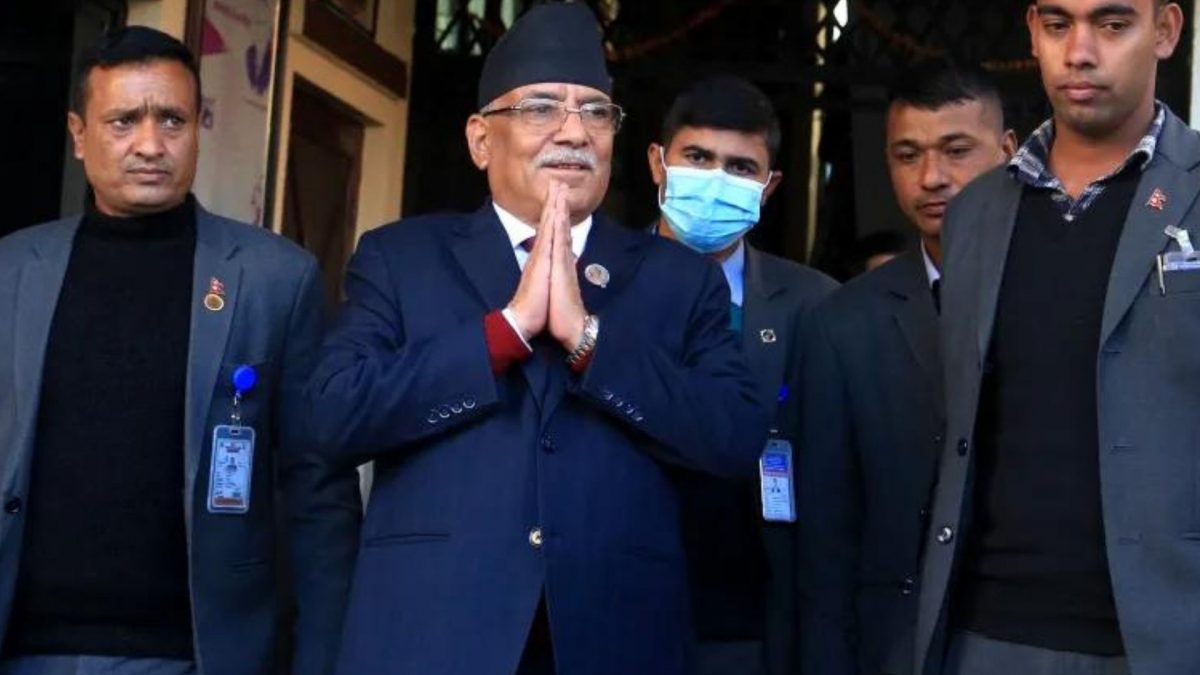Prachanda lost the vote of confidence in the House of Representatives (HoR) earlier in the evening as he received only 63 votes in the 275-member House of Representatives (HoR) with 194 votes against the motion. At least 138 votes are needed to win the vote of trust. read more
)
Nepal Prime Minister Pushpakamal Dahal 'Prachanda'. Source: FILE/AFP
President Ram Chandra Paudel on Friday started consultation with constitutional and legal experts following Prime Minister Pushpa Kamal Dahal ‘Prachanda’ failure to secure a trust vote in Parliament and asked him to hold the fort as a caretaker till a new government is in place.
The development is expected to pave the way to forming a new coalition government led by former prime minister K P Sharma Oli, 72. Prachanda lost the vote of confidence in the House of Representatives (HoR) earlier in the evening as he received only 63 votes in the 275-member House of Representatives (HoR) with 194 votes against the motion. At least 138 votes are needed to win the vote of trust.
A total of 258 HoR members participated in the voting while one member chose no vote.
Prachanda, 69, chairman of the Communist Party of Nepal-Maoist Centre (CPN-MC), faced the trust vote as Oli-led Communist Party of Nepal-Unified Marxist Leninist (CPN-UML) withdrew support from his government last week after inking a power-sharing deal with the largest party in the House – the Nepali Congress (NC) – led by Sher Bahadur Deuba.
“As HoR Speaker Dev Raj Ghimire informed the President that the Prime Minister lost floor test in the house on Friday, the President asked him to continue as caretaker Prime Minister as per Article 77-3 of the Constitution,” according to sources at the President’s office.
President Paudel has started consultation with constitutional and legal experts in the wake of Prachanda’s failure to secure a trust vote, thereby creating constitutional responsibility on the former to summon political parties for the formation of a new government.
“In this regard, President Paudel held consultations with legal experts on how constitutional provisions could be employed towards the formation of a new government,” the sources added.
In the meantime, NC and CPN-UML are busy in preparation for submitting their claim to form a new coalition government as soon as the President calls for the formation of a new government.
The NC has 89 seats in the HoR, while CPN-UML has 78. Their combined strength of 167 is much more than the 138 required for a majority in the lower house.
Deuba has already endorsed Oli as the next prime minister as per the 7-point deal both parties agreed upon on Monday before toppling Prachanda-led government.
According to the agreement, Oli and Deuba will share the premiership during the remaining period of the House of Representatives; in the first phase Oli will become the Prime Minister for one and a half years and then, Deuba will take the seat for the rest of the period.
Prachanda had become the Prime Minister of Nepal in December 2022. A month ago, the parliamentary elections did not throw any clear winner. Even though Prachanda had contested the elections with NC led by Sher Bahadur Deuba, the then-prime minister, he switched sides after the results and joined the rival faction of CPN-UML of Oli and became the prime minister.
This was the fifth time that Prachanda had undertaken a floor test in the parliament since forming the government more than a year and a half. The first of the tests came when he had to prove the majority for the first time. Then, just three months after the formation of the government, he again faced a floor test as Oli withdrew the support and Prachanda had to join ranks with NC to form the government and prove his majority. The third test came in March as he broke ranks with NC and joined hands again with CPN-UML. A split in may in the Janata Samajbadi Party (JSP) forced the fourth test.
Nepal became a democracy in 2008. In the 16 years of electoral democracy in the country, no government or prime minister has completed their term so and political instability remains an issue in the country.

 2 months ago
13
2 months ago
13
)
)
)
)
)
)
)
)
)
)
)
)
)
)
)
)
)
)
)
)
)
)
)
)
)
 English (US) ·
English (US) ·